THE DEVIL ALL THE TIME (2020)
Sinister characters converge around a young man devoted to protecting those he loves in a postwar backwoods town teeming with corruption and brutality.
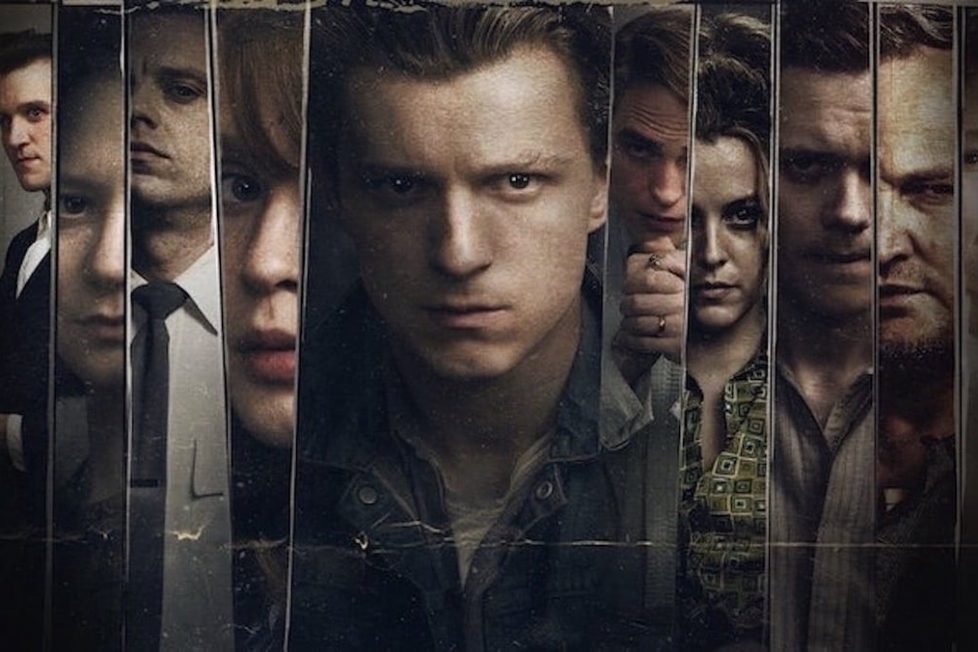
Sinister characters converge around a young man devoted to protecting those he loves in a postwar backwoods town teeming with corruption and brutality.


For writer-director Antonio Campos, The Devil All the Time is a giant step up from his indie sensibilities. After the critically acclaimed Sundance hit Christine (2016), he continues exploring the psychologies of specific individuals. Since then, he’s ventured into television, directing several episodes of The Sinner and The Punisher (2017-19). Here, he returns to the feature-length format with a melancholic crime-thriller, exploring the depths and consequences of spiritual fanaticism.
If you’re still mystified after watching Charlie Kaufman’s I’m Thinking of Ending Things (2020), you’ll be “delusional” after Netflix’s latest movie. Based on the celebrated novella by Donald Ray Pollock, The Devil All the Time sees only misery and pain. This Southern-Gothic tale spans across two rural Appalachian towns as several characters are inexorably linked together by misfortune. “Some people are born just so they can be buried” and Campos stays true to this, embracing the darkness. Produced by Jake Gyllenhaal (Donnie Darko) and featuring a star-studded cast, The Devil All the Time is a hellish ride in the best way possible.
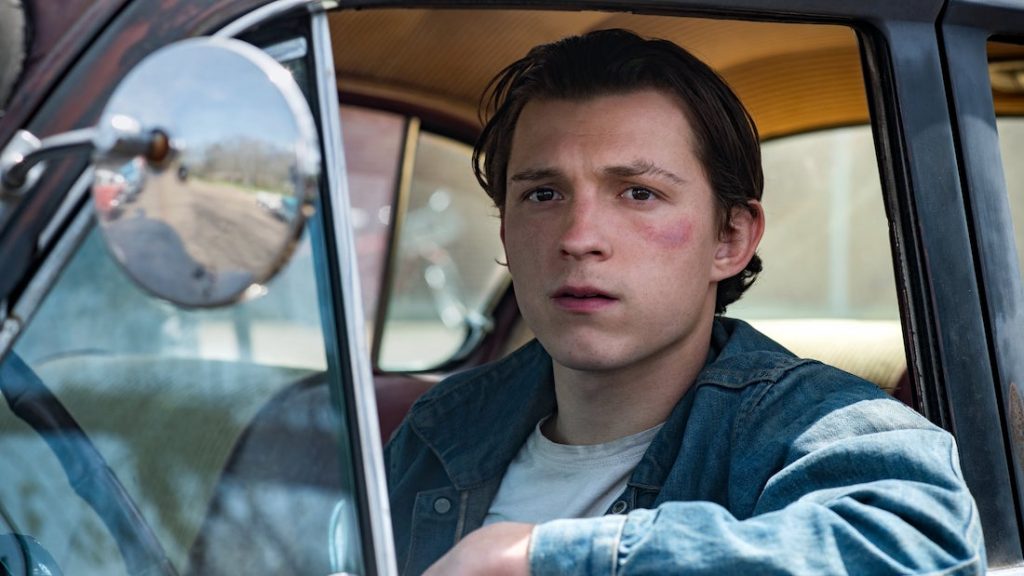
Set between 1945-1965, Willard Russell (Bill Skarsgård) returns to Coal Creek, Ohio, from serving in World War II. After turning his back on religion during his deployment, Willard finds faith again when he meets local waitress Charlotte (Hayley Bennet). The pair’s marriage leads to the birth of their son, Arvin (Michael Banks Repeta), but a family tragedy leads to Arvin being raised by his loving grandmother, Emma (Kirstin Griffith), alongside an abandoned baby girl. Jumping forward several years, an older Arvin (Tom Holland) fights to protect his adopted sister (Eliza Scanlen) while pondering his future. The arrival of a young preacher (Robert Pattison) disrupts the complexion of the town, while serial killers Carl (Jason Clarke) and Sandy Henderson (Riley Keough) carry out depraved violence on the roads nearby.
With a cast so large and consistently good, it’s almost criminal to single out any of the key players. Although there’s no clean-cut protagonist, the linchpin holding the plot together is Tom Holland (Spider-Man: Far From Home) as the volatile Arvin Russell. Growing up surrounded by tragedy and unfortunate circumstances, Arvin’s had a difficult childhood with life lessons instilled in him by the tough love of his father. Setting the tone for his character, we’re told early that Arvin’s happiest memory was witnessing his father beating two poachers. There’s an air of sadness that hangs over his character as he moves through life with a shy intensity.
However, when his quiet simmering eventually boils over, Holland is terrifying. Particularly when he confronts his sister’s high-school bullies while dishing out a brutal comeuppance with a metal wrench. Acting as the moral compass in a town filled with evil at every turn, he’s willing to do what’s necessary to protect those he loves. It’s gratifying seeing the actor shed his Peter Parker persona for a James Dean–inspired denim jacket and a pack of cigarettes. Holland’s performance is so powerful it reminds us he’s one of the best young actors around today.
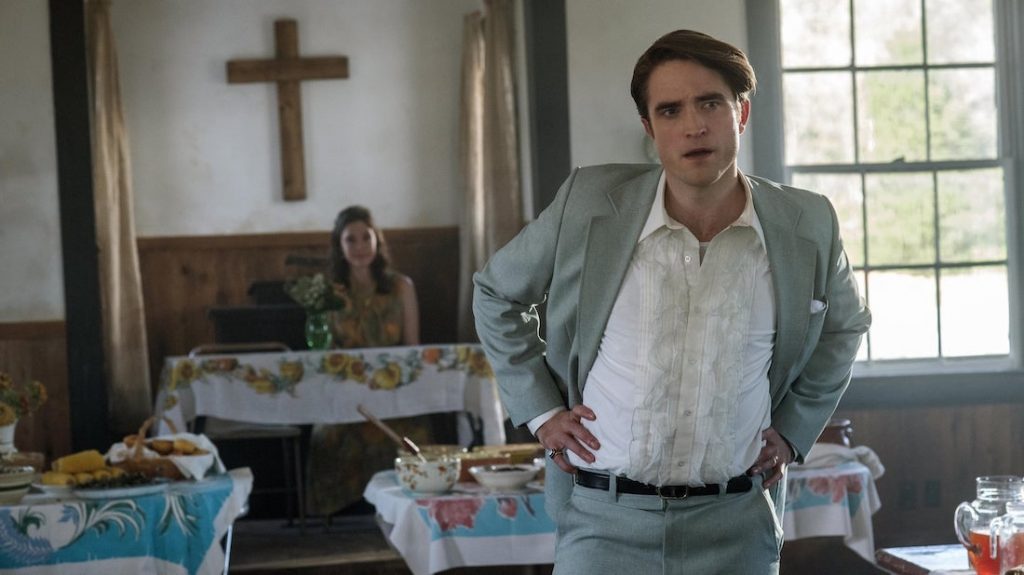
Additionally, Robert Patterson’s abilities have slowly been turning heads since his days as Edward Cullen in the Twilight saga. Between David Cronenberg’s Cosmopolis (2012) and Robert Eggers’ The Lighthouse (2019), the English actor has slowly carved out an electric career for himself. In possibly his most flamboyant role to date, Patterson plays the slick young preacher Preston Teagardin. Similar to his performance as the Dauphin of France in The King (2019), his quirkiness steals the show. Between slurping chicken livers and monologuing with his thick Southern drawl, Patterson’s messianic lunatic is simultaneously seductive and loathsome. The way he twists the Bible’s scriptures into a justification of his despicable actions echoes of Robert Mitchum in The Night of the Hunter (1955) and Michael Parks’ pastor in Red State (2011).
During a rainstorm, Teagardin’s seated with trusting parishioner Lenora (Eliza Scanlen) in his angel white Chevy, telling her “to show yourself as the lord made his first children is to truly show yourself to him”. Confused, she asks “you mean my birthday suit?” Unfortunately, with very minimal screentime, there’s a lack of time spent on developing his caring façade before the cracks begin to appear. However, his devilish performance and exuberant energy demand one’s attention.
Rounding off the cast is a smorgasbord of talented players from famous franchises. Skarsgård (It Chapter Two) dominates the first act as Arvin’s devout father Willard. After the atrocities he witnessed from fighting in WWII, he returns home struggling to find his connection with God. In a powerhouse performance, Skarsgård channels plenty of different energies into his character, all while resembling a young Michael Shannon.
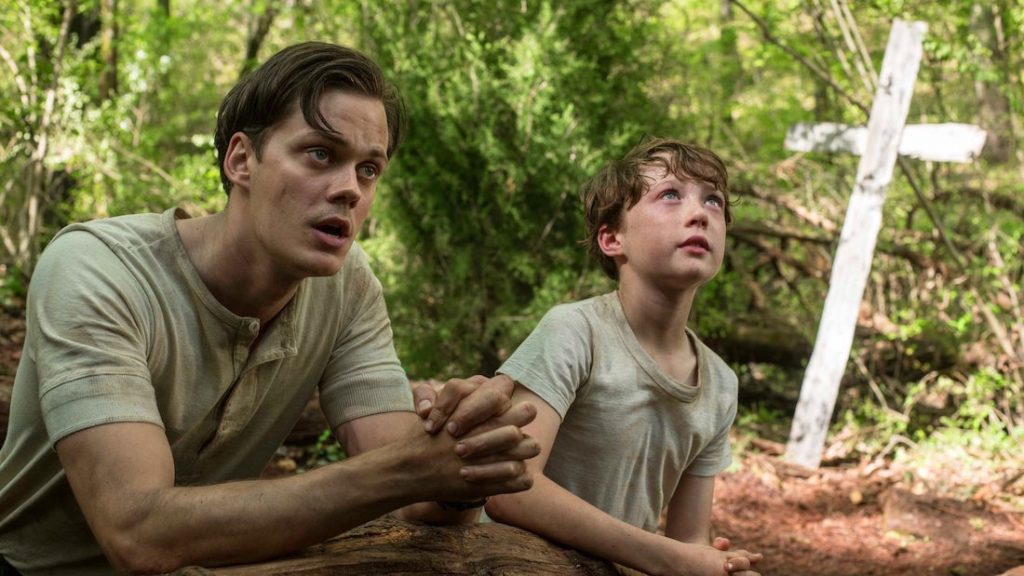
Harry Melling (The Old Guard) continues to shake off his Dudley Dursley character from the Harry Potter films with a convincing Ohio accent, playing Roy Lafferty—a small-town preacher who goes as far as pouring jars of poisonous spiders on his face to prove his faith. However, a resurrection ‘trick’ he attempts with his wife Helen (Mia Wasikowska) doesn’t go to plan.
Finally, Sebastian Stan (Avengers: Endgame) is almost unrecognisable as Sheriff Lee Bodecker, with cheeks like Marlon Brando in The Godfather (1972) and a uniform that makes him resemble an overstuffed burrito. The Sheriff runs various corrupt rackets, suggesting the authority figures are no more trustworthy than the religious ones.
With such a large ensemble, one of the biggest issues with The Devil All the Time is the overstuffed script. With a runtime of 138-minutes, several of the more interesting character arcs feel cut short. One of the most gripping subplots stories revolves around the adventures of a married couple named Carl and Sandy Henderson, as the pair go on a cross-country murder spree that evokes Natural Born Killers (1994). Carl coerces hitchhikers into having sex with Sandy while taking pornographic photographs before killing them. It’s unclear if murder is a type of religious cleansing ritual or a fetish for Carl. In one scene, Sandy asks “that’s from The Bible, isn’t it honey?” To which her husband replies “everything is from the Bible” as he captures their heinous moments on celluloid. Keough and Clarke make a dangerously unbalanced pair that brings some of the more gruesome elements. Between their performances and their character’s escapades, one couldn’t help but wish their story was a larger component.
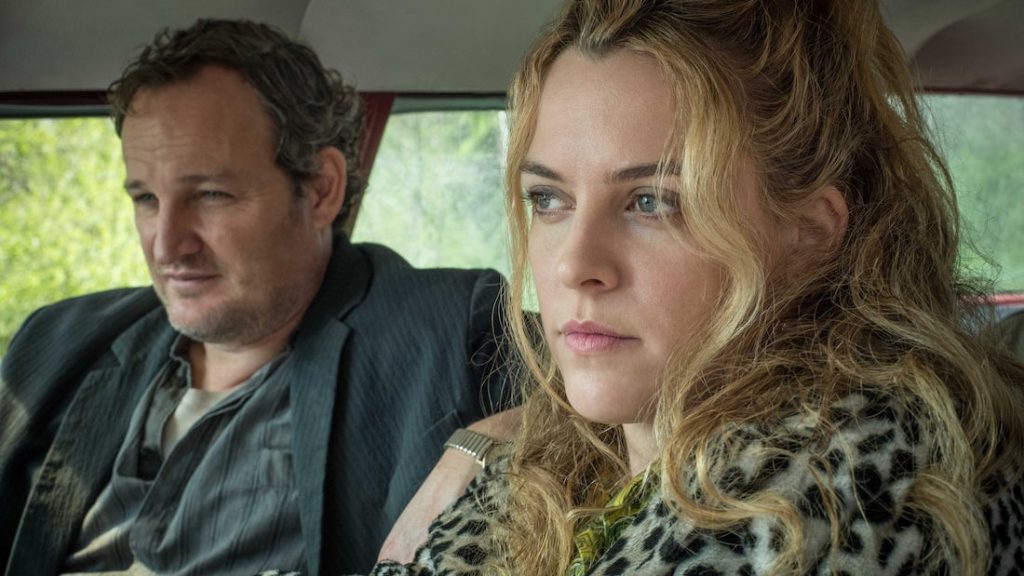
As demonstrated in his early works such as Afterschool (2008) and Simon Killer (2012), writer-director Campos has always shown an interest in the darkest corners of humanity. His previous feature, Christine, was based on the true story of Christine Chubbuck—a heartbreaking depiction of a depressed and frustrated TV reporter who committed suicide during a live broadcast. Here, the director underpins each character with a sense of humanity while bringing typical formal rigour to bear. Although filled with violence and misery, the film’s never overtly graphic. The grislier elements feature a harrowing animal sacrifice and a reoccurring flashback of a mutilated soldier hanging from a crucifix. However, they’re brief and mainly happen off-camera. Campos incisively explores the turbulence within the characters, exploring their self-destructive figures. These characters feel like fully-formed people, even when castrating each other.
What’s more menacing than the character’s actions is Campos’ interpretation of religion and faith. The evil spectre of Christianity looms over the story like a weathered crucifix over an alter. Similar to Darren Aronofsky’s mother! (2017), the filmmaker doesn’t shy away from depicting how blind faith can take people down the darkest paths. Throughout, almost every character’s decision is made on their religious beliefs. One character prays for days believing it’s the solution to cancer. Whereas if others believe God is telling them to make illogical decisions and perform inhuman actions, they’ll do it. Campos focusses on the hypocrisy of religion and the tragic pull it can have on the impoverished. Each character shows the opposite extreme how they use religion to shape their morality but ultimately are met with a similar unfortunate circumstance. The taxing amount of bleakness and religious manipulation may transform The Devil All the Time into the director’s most polarising features.
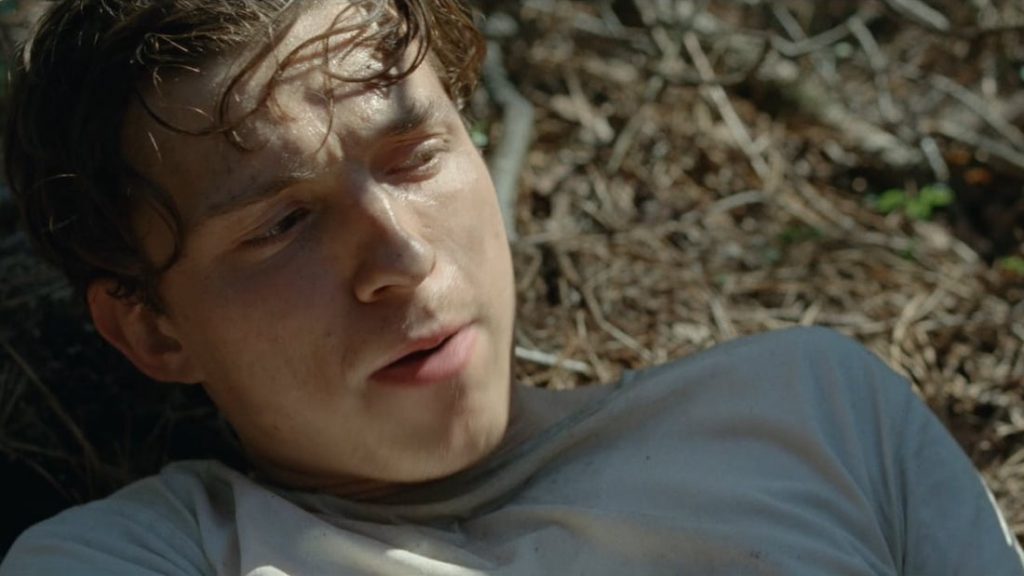
There’s scarcely a moment of joy to be found during The Devil All the Time, but that’s one of it’s best qualities. The director has a firm grip on atmosphere and tone throughout as the melancholy timeline grows dire and unpleasant. Similar to Martin McDonagh’s Three Billboards Outside Ebbing, Missouri (2018), it feels as though the characters are constantly brushing shoulders with each other. Campos and his fraternal co-writer Paulo Campos, do a magnificent job deftly weaving through several generations and communities. The non-linear editing by Sofia Subercaseaux (Mala Mala) superbly jumps back and forth between Coal Creek and Knockemstiff. Like an Appalachian Pulp Fiction (1994), several moments are revisited, growing darker with each return by offering new details. Initially, the first 40-minutes may be a little jarring as Campos creates a monstrous world about death, dysfunction, and religion. However, the director never loses sight of the unwieldy stories as they eventually culminate together in satisfying ways.
Additionally, production designer Craig Lathrop (The Lighthouse) evokes the period with the rustic environment. Captured on 35mm film by cinematographer Lol Crawley (Vox Lux), each character and location is covered in a convincing amount of dust and grit. The DP researched the 1940s and ’50s documentary photographers Walker Evans and Robert Frank, who travelled across the US taking portraits of people living on the breadline. Whereas the gloomy Southern-Gothic tale is unlocked courtesy of Pollock himself. Foreshadowing and contextualising the characters, the omniscient author narrates the tales of depravity with a moonshine folksiness. Adding a stamp of authenticity, in a particular scene he suggests one character “smelled worse than a truck stop shitter”. It’s almost as if the author is spinning this tale while sitting in an old chair on a front porch.
There have been a good number of Southern-Gothic features in the past, such as The Neon Bible (1995) and Lawless (2012). Antonio Campos takes elements of these whilst heavily leaning into themes explored in Coen Brothers’ No Country for Old Men (2007) and Derek Cianfrance’s The Place Beyond the Pine (2012). Unfortunately, with a cast so large, some of the more interesting characters fall by the wayside. Nonetheless, they all deliver a phenomenal performance. The Devil All the Time’s brooding violence and foreboding tone is consistently engaging and will keep you on the edge of your toes from beginning to end.
USA | 2020 | 138 MINUTES | 2.39:1 | COLOUR | ENGLISH

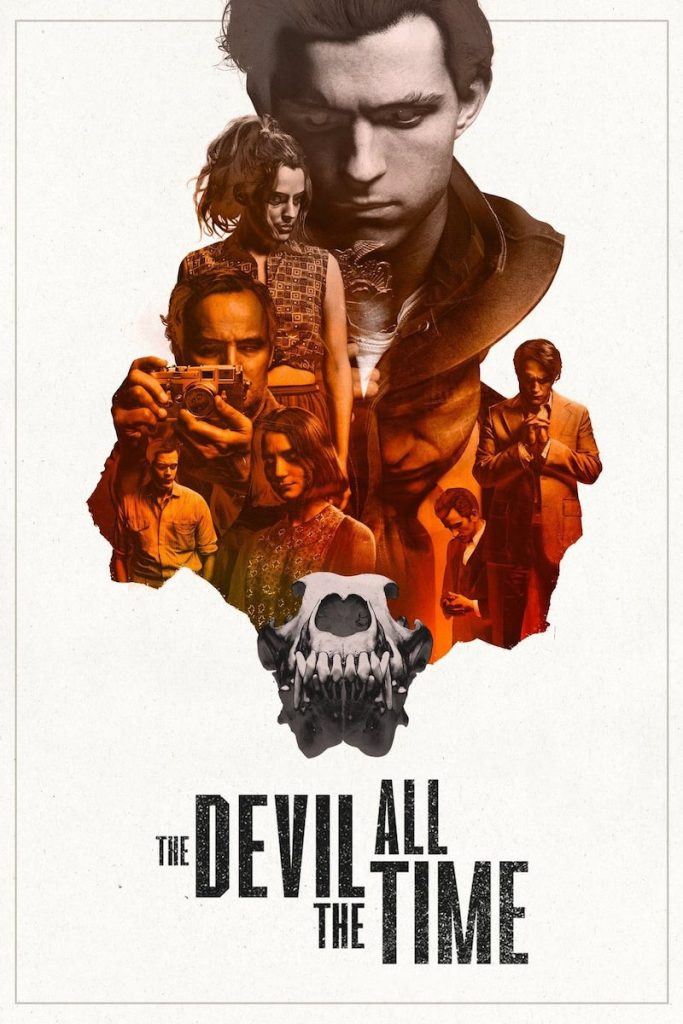
director: Antonio Campos.
writers: Antonio Campos & Paulo Campos (based on the book by Donald Ray Pollock).
starring: Tom Holland, Bill Skarsgård, Riley Keough, Jason Clarke, Sebastian Stan, Haley Bennett, Eliza Scanlen, Mia Wasikowska & Robert Pattinson.
